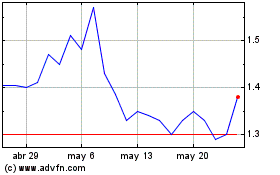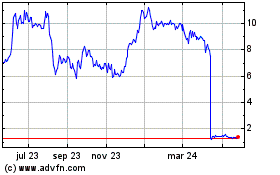Trial did not meet the primary endpoint of
percent change in 28-day TSC-associated seizure frequency (p=0.09);
results showed numerically higher response rates for ganaxolone
than placebo
Ganaxolone was generally well-tolerated in
TrustTSC with a safety profile consistent with previous clinical
trials
Cost reduction activities are underway
Marinus has engaged Barclays as an advisor to
assist with evaluating strategic alternatives
Marinus Pharmaceuticals, Inc. (Nasdaq: MRNS), a pharmaceutical
company dedicated to the development of innovative therapeutics to
treat seizure disorders, today announced that the Phase 3 TrustTSC
trial evaluating oral ganaxolone for the treatment of seizures
associated with tuberous sclerosis complex (TSC) in children and
adults did not meet the primary endpoint of percent change in
28-day TSC-associated seizure frequency. While reductions in
seizure frequency favored the ganaxolone arm, the primary endpoint
did not achieve statistical significance.
“As the first controlled trial in TSC that allowed enrollment of
patients taking a range of concomitant antiseizure medications,
which included mTOR inhibitors and cannabidiol, these data
represent a significant advancement in our understanding of the use
of ganaxolone with other standard of care treatments,” said Scott
Braunstein, M.D., Chairman and Chief Executive Officer of Marinus.
“We are disappointed that the results of the TrustTSC trial are not
likely to be sufficient for an sNDA filing. We are deeply grateful
for the contributions of the clinical trial investigators,
patients, and caregivers whose support and participation made the
study possible.”
TrustTSC (NCT05323734) was a global Phase 3 randomized,
double-blind, placebo-controlled clinical trial of adjunctive oral
ganaxolone treatment in children and adults with TSC-related
epilepsy (n=129).
Topline data demonstrated that:
- The trial did not achieve statistical significance on its
primary endpoint of percent reduction in 28-day frequency of
TSC-associated seizures: median reduction was 19.7% for ganaxolone
compared with 10.2% for placebo (p=0.09).
- Ganaxolone was generally well-tolerated with a safety profile
consistent with previous clinical trials. The most frequent adverse
event was somnolence: 28.1% for ganaxolone compared with 16.9% for
placebo.
Marinus will continue to support and invest in the commercial
growth of ZTALMY® (ganaxolone) oral suspension CV, which is
FDA-approved for the treatment of seizures associated with CDKL5
deficiency disorder in patients two years of age and older, where
more than 200 patients are receiving treatment.
As a result of the TrustTSC outcome, Marinus is discontinuing
further ganaxolone clinical development and is taking additional
steps to reduce costs, including a reduction in its workforce. The
Company has also commenced a process to explore strategic
alternatives with the goal of maximizing value for its
stockholders. Marinus has engaged Barclays as an advisor to assist
in reviewing its strategic alternatives. There can be no assurance
that the exploration of strategic alternatives will result in any
agreements or transactions, or as to the timing of any such
agreements or transactions. Marinus does not intend to discuss or
disclose further developments regarding the exploration of
strategic alternatives unless and until its board of directors has
approved a definitive action or otherwise determined that further
disclosure is appropriate or required by law.
About the TrustTSC Trial TrustTSC (NCT05323734) was a
global Phase 3 randomized, double-blind, placebo-controlled
clinical trial of adjunctive oral ganaxolone treatment in children
and adults with TSC-related epilepsy. The trial consisted of a
four-week baseline period, followed by a 16-week double-blind
treatment phase, which included a 28-day titration period followed
by a 12-week maintenance period. Participants then had the
opportunity to enter the ongoing long-term open-label extension.
The primary endpoint was percent change in 28-day TSC-associated
seizure frequency. TrustTSC enrolled participants at sites in the
U.S., Western Europe, Canada, Israel, Australia and China. To be
eligible, participants were required to have inadequate seizure
control and have been treated with at least two prior antiseizure
medications.
About Tuberous Sclerosis Complex Tuberous sclerosis
complex (TSC) is a rare, multisystem genetic disorder caused by
inherited mutations in the TSC1 gene or TSC2 gene. It is often
characterized by non-cancerous tumors, skin abnormalities, and
severe neurological manifestations, including refractory seizures
and neurodevelopmental delays. The condition is a leading cause of
genetic epilepsy, often occurring in the first year of life as
either focal seizures or infantile spasms. While the disease
phenotype can be extremely variable, neurologic manifestations such
as epilepsy can be seen in up to 90% of TSC patients.
About ZTALMY® (ganaxolone) oral suspension ZTALMY
(ganaxolone) is a neuroactive steroid GABAA receptor modulator that
acts on a well-characterized target in the brain known to have
anti-seizure effects. It is a prescription medicine that has been
approved by the U.S. Food and Drug Administration and the European
Commission for appropriate patients with CDKL5 deficiency
disorder.
U.S. Prescribing Information for ZTALMY® (ganaxolone) oral
suspension CV.
European Union Summary of Product Characteristics for
ZTALMY.
About Marinus Pharmaceuticals Marinus is a
commercial-stage pharmaceutical company dedicated to the
development of innovative therapeutics for seizure disorders. The
Company’s product, ZTALMY® (ganaxolone) oral suspension CV, is an
FDA-approved prescription medication introduced in the U.S. in
2022. For more information, please visit www.marinuspharma.com and
follow us on Facebook, LinkedIn and X.
Forward-Looking Statements To the extent that statements
contained in this press release are not descriptions of historical
facts regarding Marinus, they are forward-looking statements
reflecting the current beliefs and expectations of management made
pursuant to the safe harbor provisions of the Private Securities
Litigation Reform Act of 1995. Words such as "may", "will",
"expect", "anticipate", "estimate", "intend", "believe", and
similar expressions (as well as other words or expressions
referencing future events, conditions or circumstances) are
intended to identify forward-looking statements. Examples of
forward-looking statements contained in this press release include,
among others, our expectations regarding the review and exploration
of strategic alternatives and their potential impact on stockholder
value; our plans to reduce costs to extend our resources; our
expectations regarding the future of the company's operations,
including our development and commercialization activities; and
other statements regarding future events.
Forward-looking statements in this press release involve
substantial risks and uncertainties that could cause our actual
results, performance or achievements to differ significantly from
those expressed or implied by the forward-looking statements. Such
risks and uncertainties include, among others, the risk that
exploration of strategic alternatives may not result in any
definitive transaction or enhance stockholder value and may create
a distraction or uncertainty that may adversely affect our
operating results, business, or investor perceptions; uncertainties
regarding future costs and expenses; Marinus’ ability to continue
as a going concern; Marinus’ ability to maintain compliance with
its debt covenants and risks and uncertainties regarding the
ability to do; unexpected market acceptance, payor coverage or
future prescriptions and revenue generated by ZTALMY; the pricing
and reimbursement process can be time consuming and may delay
commercialization of ZTALMY in one or more European countries; our
dependence on Orion to commercialize ZTALMY in Europe pursuant to
the exclusive collaboration agreement; unexpected actions by the
FDA or other regulatory agencies with respect to our products;
competitive conditions and unexpected adverse events or patient
outcomes from being treated with ZTALMY, the company’s cash and
cash equivalents may not be sufficient to support its operating
plan for as long as anticipated; our ability to comply with the
FDA’s requirement for additional post-marketing studies in the
required time frames; the size and growth potential of the markets
for the company’s products, and the company’s ability to service
those markets; the company’s expectations, projections and
estimates regarding expenses, future revenue, capital requirements,
and the availability of and the need for additional financing;
delays, interruptions or failures in the manufacture and supply of
our product; the company’s ability to obtain additional funding to
support its programs; and the company’s ability to protect its
intellectual property. This list is not exhaustive and these and
other risks are described in our periodic reports, including our
annual reports on Form 10-K, quarterly reports on Form 10-Q and
current reports on Form 8-K, filed with or furnished to the
Securities and Exchange Commission and available at www.sec.gov.
Any forward-looking statements that we make in this press release
speak only as of the date of this press release. We assume no
obligation to update forward-looking statements whether as a result
of new information, future events or otherwise, after the date of
this press release.
View source
version on businesswire.com: https://www.businesswire.com/news/home/20241024735870/en/
Company Contacts
Investors Sonya Weigle Chief
People & Investor Relations Officer Marinus Pharmaceuticals,
Inc. sweigle@marinuspharma.com
Media Molly Cameron Director,
Corporate Communications & Investor Relations Marinus
Pharmaceuticals, Inc. mcameron@marinuspharma.com
Marinus Pharmaceuticals (NASDAQ:MRNS)
Gráfica de Acción Histórica
De Nov 2024 a Dic 2024

Marinus Pharmaceuticals (NASDAQ:MRNS)
Gráfica de Acción Histórica
De Dic 2023 a Dic 2024
